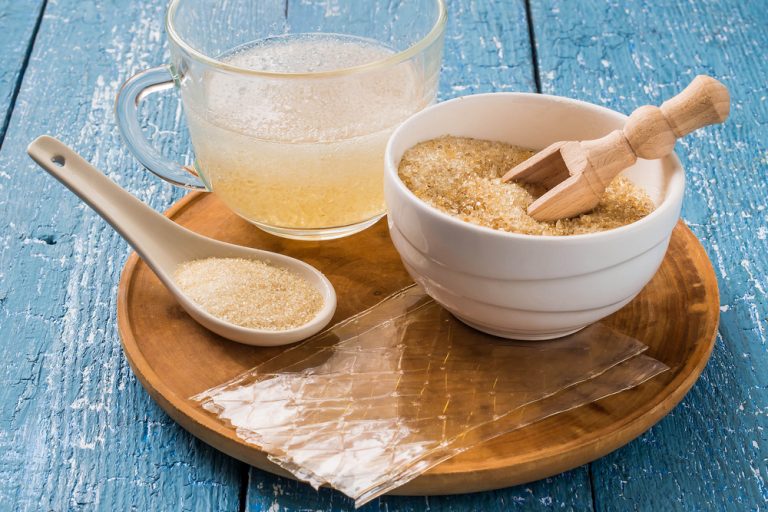Gelatin is used as a thickening substance for various types of dishes. Its source is primarily cooked cartilage, skin and animal bones. This method of preparation helps in the extraction of these parts of collagen. Gelatine is also rich in amino acids, ie proline, valine and glycine. It is said that it can affect the strengthening of joints and bones. What are the properties of gelatin? Is it worth using? Is gelatin really a good idea?
Gelatin for joints
Based on numerous studies, it can be confirmed that gelatin has a positive effect on improving the condition of:
- joints
- cartilage
- bonds
- tendons
The process of renewal of structures in the human body is long-lasting. So you can not count on the fact that in a short time gelatin supplementation will bring incredible results in a short time. It is also worth remembering that the addition of vitamin C is necessary for the proper synthesis of collagen. If the diet is lacking this antioxidant, its additional supplementation is recommended.
What nutritional values are found in gelatin?
In 100g of gelatin we can find:
Energy value at 336kcal,
- 85g of protein,
- 0g carbohydrates
- 0.1 g fat
Collagen for athletes
Sporians should have a closer look at the issue of collagen, the source of which is gelatine.
During training, repeated overloading of joints occurs, thereby increasing the risk of their injury. Supplementation with collagen may improve the training results as well as health. It works almost like a regenerating balm for joints. It is thanks to it, that they are in good condition and function better.
The human body produces collagen up to 25 years old. After this period, ceases its production, and thus increases the risk of injuries in the joints. The effects of its shortage are exposed, among others, athletes and gym athletes whose joints are poor in collagen and are more susceptible to injury.
Running also has a negative impact on the knee joints - these are repeatedly overloaded. Therefore, for the sake of the health of the knees, supplementation with collagen is even desirable.
The use of hydrolyzed collagen by athletes reduces the risk of degenerative changes in the high-risk group and also reduces the sensation of pain. A similar treatment can be obtained including gelatine for your diet.

Properties of gelatin
What properties of gelatin are definitely worth paying attention to?
- Supports digestive functions by stimulating the production of gastric juices. Thanks to efficient binding to water, it helps in moving the food in the digestive system
- It accelerates the reduction of body weight - it reduces appetite and increases the feeling of satiety. Due to the fact that gelatin is a protein, it provides essential amino acids and is low in calories
- It supports the maintenance of hormone management - thanks to the amino acid content of glycine, it has an effect on insulin and can prevent hypoglycaemia
- Strengthens bones - thanks to the content of the exogenous amino acid lysine, gelatin supports the absorption of calcium and strengthening of bones
- It improves muscle regeneration - through the content of amino acids important for this process, i.e. arginine and glycine
- Relieves pain and supports the functioning of joints - thanks to the content of glycine and proline. However, more research is needed to confirm this thesis
- It supports the condition of hair and nails. It is worth remembering, however, that good condition of hair and nails is a reflection of the well-being of the whole organism
- It improves connective tissue health and elasticity of tendons
- It has anti-inflammatory effects
- It affects the firmness of the skin and accelerates its regeneration
- It balances too much supply of sulfur amino acids
Is gelatin healthy?
Gelatin, like any other food product, used within the normal range, does not bring any negative side effects. Due to a number of positive properties it has, supplementation with gelatin is the most healthy and beneficial. However, it should be remembered that many other products contain a given amount of gelatin and important amino acids, e.g. yogurt. It may turn out that with a well-composed diet, the preparation of gelatin solutions may not be necessary.
Gelatin for athletes' joints
Edible gelatine is a product commonly used as an emulsifier and gelling agent. Is marked on the list of legal food additives of the European Union with the symbol E441. It is characterized by a number of health-promoting properties, and also does not show a tendency to deteriorate health. With a properly composed diet, supplementation with gelatin is not necessary. However, in the case of amino acid deficiency, ie proline, valine or glycine, the use of gelatin can help the body function properly.






